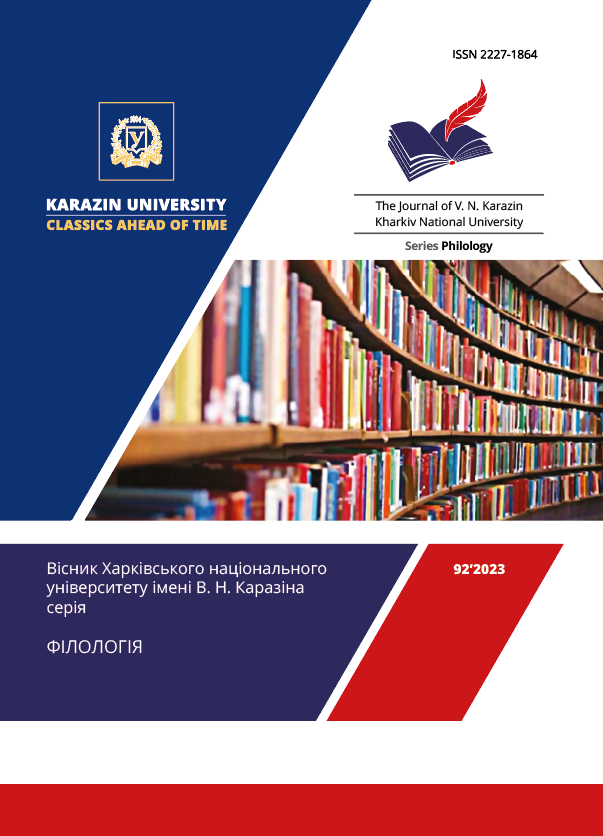Galician literary space through the prism of the concepts of borderland, Galician borderland and Galician literary borderland
Abstract
The author set herself the goal of analyzing the concepts of Galicia, Galicianness, borderland, Galician borderland, Galician literary borderland and based on such an analysis characterizing the relationships between Galicia and the most famous Galician writer of the first half of the 20th century Bruno Schulz.
The first article of the outlined cycle of publications is devoted to the disclosure of the essence of the cognitive concept of Galicia with an emphasis on the Schulz period – the end of the 19th – the first half of the 20th century; the goal of another scientific exploration of the conceptual cycle of the author’s research is ontologization in the scientific-research space of the concept Galicianness with actualization based on the knowledge and information represented by the concept.
In the offered publication, the author has become involved as a participant in the modern scientific discussion that is taking place around the phenomenon of «borderland» and has presented the term-concept Galician literary borderland in the cognitive and conceptual format, as a logical combination of the structural components of the borderland → Galician borderland → Galician literary borderland, in other words, in the format of the analysis of a single conceptual complex, the vivid representative of which is Bruno Schulz.
The analysis of the content load of the concept of borderland in all its diversity makes it possible to count it among cross-cutting interdisciplinary phenomena associated with various scientific branches and spheres of activity, and also allows asserting the presence of certain mutual influences of the borderland on the peculiarities of the literary and artistic creativity of its representatives and vice versa, in particular on the example of the characteristics of the two[1]component pair of nominaGalician literary borderland ↔ Galician writer Bruno Schulz, whose members are in difficult relations of similarity and opposition.
The final article of the cycle of publications about Galicia will be devoted to the generalization of the research on the relationships between Galicia and the works of art created in its context by bright representatives of the Galician literary borderland.
Downloads
References
Aizenbart, L. (2015). Cultural syncretism of the terms «borderland» and «kresy»: a literary aspect. Problems of the humanities: a collection of scientific works of Ivan Franko Drohobytsk State Pedagogical University. Series «Philology», 36, 162–172. Drohobych.
Aizenbart, L. (2021). Literary presentation of Galicia at the end of the 18th – the beginning of the 20th century: from image to concept. Transcarpathian philological studies: collection of scientific works of the Uzhhorod National University, 16, 246–251. Drohobych: «Helvetika» Publishing House.
Aizenbart, L. M. (2016). Galician literary borderland in personalities. Current issues of aesthetics and poetics of a literary work. Bulletin of the Dnipropetrovsk University named after Alfred Nobel. Series «Philological Sciences», 2 (12), 111–117.
Aizenbart, L. M. (2018). Galicia on the literary map of various national literatures (the end of the 18th – the beginning of the 20thcenturies). Literatures of the world: poetics, mentality and spirituality: a collection of scientific papers, 12, 72–84. Kryvyi Rih.
Aizenbart, L. M. (2016). The term «concept»: the problem of definition and approaches to study. Scientific notes of Ternopil National Pedagogical University named after Volodymyr Hnatyuk. Series: Literarystudies, 45, 314–326. Ternopil: TNPU.
Holyk, R. (2014). Аnima galiciana and / or fata morgana: real and virtual Galiciain literature and mentality. Bulletin of Lviv University. Philological series, 60, 1, 53–61.
Hud, B. (2000). Ukrainians – Poles: who is to blame? In search of the root causes of the Ukrainian-Polish conflicts of the first half of the 20th century. Lviv: Kalvariia.
Yevchuk, U. Ye. (2015). Historical memory of border residents in Łukasz Saturczak’s novel «Galicia». Transcarpathian Philological Studies, 13, 3, 167–172.
Kononenko, V. I. (2004). Concepts of Ukrainian discourse. Kyiv – Ivano-Frankivsk.
Kononenko, V. I. (2008). Language in the context of culture: a monograph. Kyiv – Ivano-Frankivsk.
Kryvytska, O. (2015). Discourse of Borderland in Sociocultural Studies: Theoretical and Methodological Aspects. Naukovi zapysky Instytutu politychnykh i etnonatsionalnykh doslidzhen im. I. F. Kurasa NAN Ukrainy, 4 (78), 173–198.
Kryvytska, O. (2016). Studying the borderland in the context of the paradigm of space. Scientific notes of the Institute of Political and Ethnonational Studies named after I. F. Kuras NAS of Ukraine, 2 (82), 77–90.
Markova, M. (2007). Concept and conceptualization in modern literary studies. Questions of literary studies: scientific collection, 74, 317–324. Chernivtsi: Ruta.
Matorina, N. M. (2023). Galicianness through the prism of the notion concept. Scientific Bulletin of the International Humanitarian University. Series«Philology», 59. [The article has been accepted for publication].
Matorina, N. M. (2023). The concept of Galicia as the theoretical and methodological background for scientific investigations of literary studies direction. New philology, 89. [The article has been accepted for publication].
Plokhii, S. (2020, december, 28). Borderland – a cultural feature of Ukraine. Zbrucz. URL: https://theukrainians.org/plokhiy-yermolenko/.
(2019). The Polish-Ukrainian Borderlands: Ethnopolitical, Linguistic, and Religious Criteria of Self-identification of the People: a Monograph. Lviv.
Prokhasko, Yu. (2013). A possible history of Galician literature (І). URL: https://zbruc.eu/node/15625.
Prokhasko, Yu. (2014). A possible history of Galician literature (ІI). Zbrucz. URL: https://zbruc.eu/node/21521.
Uliash, S. (2011). Literature of the borderland – the borderland of literature. Kyiv: Universytet «Ukraina».
Chmelyk, R. (2015). Cultural heritage of the modern Ukrainian-Polish borderland in the contex to finter-ethnic relations. Ethnological notebooks, 116, 91–98). Lviv.
Chmelyk, R. (2014). The concept as an object of linguistic research. Ethnological notebooks, 116, 221–228. Lviv.
Shepitko, S., & Sheichenko, O. (2009). The concept as an object of linguistic research. Bulletin of the Mariupol State Humanitarian University. Series: Philology, 2, 349–357.
Babiński, G. (1997). The Polish-Ukrainian borderland: ethnicity, religious diversity, identity. Krakоw: NOMOS.




